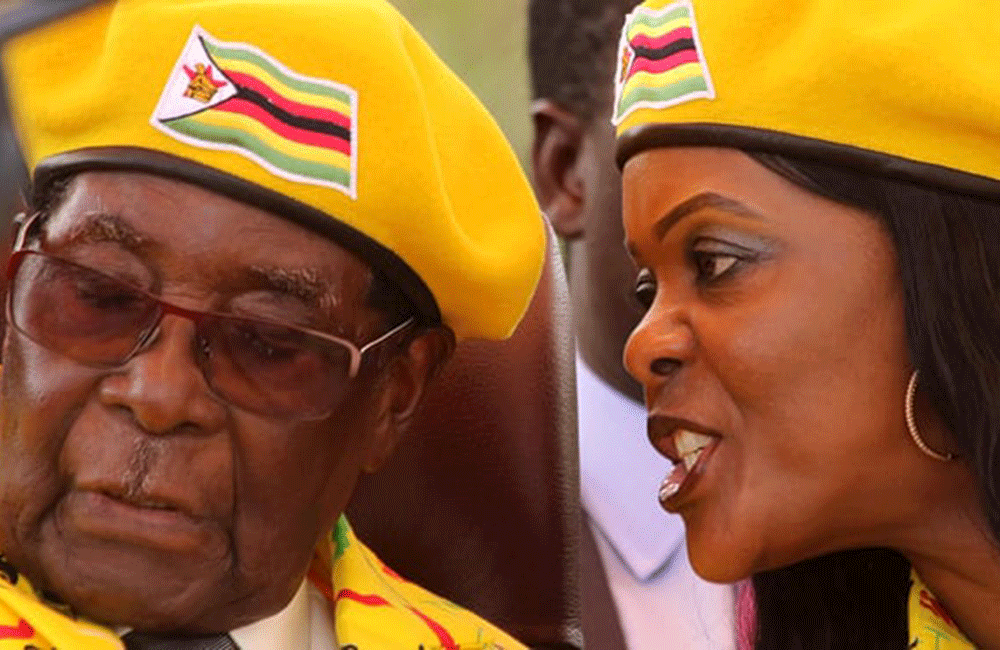Authorities in Zimbabwe have launched a campaign to find and repatriate millions of dollars of cash and assets smuggled overseas during the last years of the rule of Robert Mugabe, senior officials say.
Goodson Nguni, the commissioner of the Zimbabwe Anti-Corruption Commission (Zacc) told the Guardian that the effort would be intensified when an amnesty allowing voluntary surrender of illegally obtained wealth expired at the end of next month.
Several high-profile politicians who were close to Grace Mugabe, the former first lady, and opponents of Emmerson Mnangagwa, the new president, have already been detained, prompting concerns that graft investigations might be used as a political tool.
“The big worry is that there is really no comprehensive anti-corruption drive but rather … some kind of witch-hunt by a victorious faction within the Zanu-PF … This is nothing to do with ending corruption, but a lot to do with vengeance,” said Dewa Mavhinga, Human Rights Watch’s southern Africa director.
Nguni denied that the campaign was only targeting enemies of Mnangagwa, the former spy chief and vice-president who took power after a military takeover in November.
“We are going to follow the evidence. This is not political,” Nguni said.

Though her husband is still respected for his role in the brutal liberations wars of the late 1960s and the 1970s, Grace Mugabe is widely reviled in Zimbabwe for her extravagant lifestyle. The 52-year-old former secretary was also routinely accused of involvement in corrupt land deals.
Mnangagwa told the BBC in Davos last week that no one had been granted immunity from prosecution, though the 94-year-old former president would be “left in peace”.
Local media reports have described a series of investigations targeting Grace Mugabe’s farm at Mazowe, on the outskirts of the capital Harare.
“These are just rumours. There may be police investigations or other inquiries but not by us,” he said.
Nguni confirmed the Zacc was investigating whether the former first lady fraudulently obtained a doctorate in 2014.
Grace Mugabe, whose apparent desire to succeed her husband prompted the army takeover that eventually saw Robert Mugabe resign, was awarded a PhD by the University of Zimbabwe after only months of supposed study.
Last month three luxury cars apparently belonging to Grace Mugabe or her children were briefly detained in Botswana as they were driven out of Zimbabwe.
The Rolls-Royce Ghost, a red Porsche and a Range Rover – worth at least $500,000 in total – were suspected of being used to smuggle cash and other valuables out of Zimbabwe.
They were released after several hours of searches and when Russell Goreraza, Grace Mugabe’s eldest son, produced documents proving that his mother had granted him permission to drive her Rolls-Royce to Botswana and on to South Africa.
Grace Mugabe has purchased significant property in South Africa, including a luxurious residence in Johannesburg.
Last year however she was controversially granted diplomatic immunity to avoid arrest after an alleged assault on a model whom she found with her sons in a luxury apartment in the city.
The former first lady would be unlikely to be granted a similar privilege on future visits to South Africa, potentially ruling out one bolthole should life in Zimbabwe become too difficult.
So far, the family appear to have escaped any direct sanction, though a security detachment provided by the government to the first lady, who has remained in the luxurious home in Harare she shares with her husband since the military takeover, has been redeployed.
Under an agreement negotiated before he stepped down, Mugabe and his wife will be entitled to diplomatic passports and four first-class air or train trips within Zimbabwe and four trips abroad on a private plane each year.
Mugabe will get a residence, a car fleet and private air travel as part of a new government-funded retirement package for former leaders, according to state media.
Mugabe will also be entitled to at least 20 staffers including six personal security guards, all paid for from state coffers, according to details of the benefits published in The Herald newspaper.
Mnangagwa is hoping that a high profile campaign against corruption will bolster the chances of Zanu-PF, the ruling party, in elections due before July.
The home affairs minister, Obert Mpofu, has suggested the government might turn to Interpol to hunt down those outside the country.
“We are doing everything possible to ensure that those that have committed crimes within Zimbabwe and are outside Zimbabwe are brought to book. If it means engaging Interpol, we will go that route,” Mpofu was quoted as saying

Leave your comments
Login to post a comment
Post comment as a guest